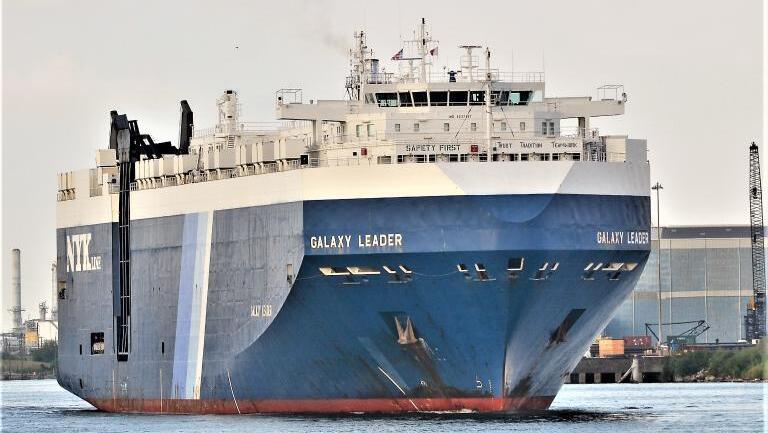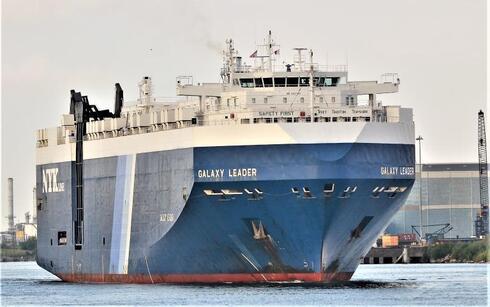
The global economic and trade fallout from Yemen’s Houthi cargo ship hijack
The concern in this situation doesn't arise from Israeli ownership of the transportation company but rather from the potential scenario wherein a ship transporting thousands of cars, valued at hundreds of millions of dollars, could face hijacking en route to Israel due to suspicions linked to Israeli ownership
Yemen's Houthis military group announced on Sunday it had seized a British-owned and Japanese-operated cargo ship in the southern Red Sea. Israel labeled in response the incident as an "Iranian act of terrorism" with consequences for international maritime security. The hijacking of the ship by militants from Yemen is expected to have global commercial and economic effects, not necessarily limited to Israel.
The Houthis, a Yemeni military group and an ally of Tehran, have been launching long-range missile and drone salvoes at Israel in solidarity with Palestinian Hamas militants in the Gaza Strip. The Houthis claimed to have seized a ship in that area but described it as Israeli. "We are treating the ship's crew in accordance with Islamic principles and values," a spokesperson for the group said, making no reference to the Israeli account.
Japan's top government spokesperson on Monday confirmed the capture of the Nippon Yusen-operated ship, Galaxy Leader, adding that Japan was appealing to the Houthis while seeking the help of Saudi, Omani, and Iranian authorities to work toward the swift release of the vessel and its crew.
The Galaxy Leader is a RoRo (Roll-on/Roll-off) ship - cargo vessels designed to transport wheeled cargo, such as cars, motorcycles, trucks, semi-trailer trucks, buses, trailers, and railroad cars. These vehicles can be driven on and off the ship using their own wheels or with the assistance of a platform vehicle, such as a self-propelled modular transporter.
According to the route map, the Galaxy Leader was en route to India, carrying thousands of cars. Online records indicate that the ship is registered in Nassau but operated by Ray Car Carriers, one of the world's largest vehicle transportation companies. The company is owned by Israeli businessman Rami Ungar, who is also the importer of Kia cars to Israel.
As per the Ray Car Carriers website, the company operates RoRo ships belonging to eight different categories, ranging from vessels carrying 2,200 cars to those transporting 7,700 cars. Although the company does not specify the exact number of ships in its fleet, it appears to operate dozens of them.
Related articles:
Ungar himself is no stranger to attacks by Iran and its proxies on ships, but an attack and possible hijacking of a RoRo ship is a new and costly development. The concern in this case does not stem from Israeli ownership but rather from the potential scenario where a ship carrying thousands of cars, valued at hundreds of millions of dollars, might be hijacked en route to Israel due to suspicions of Israeli ownership. Any attempt to harm Israel or the valuable cargo onboard could result in the loss of goods or demands for ransom.
In the specific incident that occurred yesterday, foreign publications suggest that the Houthis' interest was focused on the identity of the crew members (who are not Israelis). However, a situation where a ship bound for Israel is hijacked while transporting thousands of cars could pose a significant problem.
In recent weeks, sources in the automotive industry have reported increases in the prices of marine transportation insurance for vehicles bound for Israel. Ships have already "skipped" the port of Ashdod in recent weeks, opting to anchor in Haifa due to concerns about potential rocket attacks. The hypothetical scenario of a ship carrying cars to Israel being hijacked or damaged could result in elevated insurance rates, ultimately impacting the consumer's expenses.
Ships arriving today from the Far East, transporting cars manufactured in Japan, South Korea, or China, navigate through the Red Sea en route to Eilat. Alternatively, they may pass through the Suez Canal, proceeding to Ashdod and Haifa before reaching European destinations. The prospect of ships carrying cars for Israel or those owned by Israelis being hijacked or damaged could contribute to a further escalation in insurance prices.
Israeli Prime Minister Benjamin Netanyahu's office said: "This is another Iranian act of terrorism that represents an escalation in Iran's belligerence against the citizens of the free world, with concomitant international ramifications vis-a-vis the security of global shipping routes."
"We strongly condemn such acts," Chief Cabinet Secretary Hirokazu Matsuno told a news conference. No Japanese nationals are among the crew, he said.
Japan's Nippon Yusen, also known as NYK, said the company had set up a task force to gather more information, including on the safety of the 25 crew, who are from the Philippines, Bulgaria, Ukraine, Romania, and Mexico. The vessel, a car carrier, had been heading toward India from Europe with no cargo, a spokesperson said.
Last week, Houthi leadership said their forces would make further attacks on Israel and they could target Israeli ships in the Red Sea and the Bab al-Mandeb Strait. The U.S. was monitoring the situation, a defense official said.
